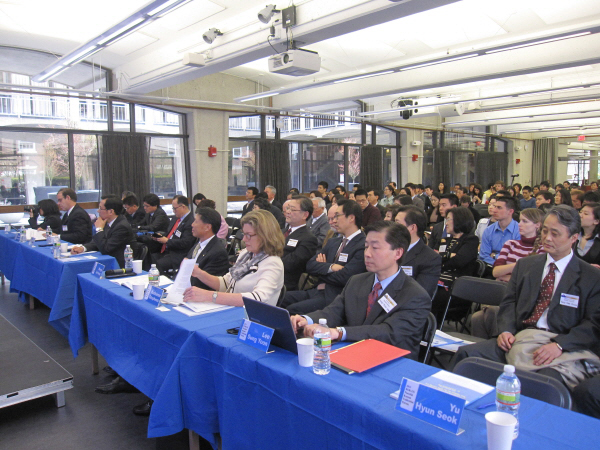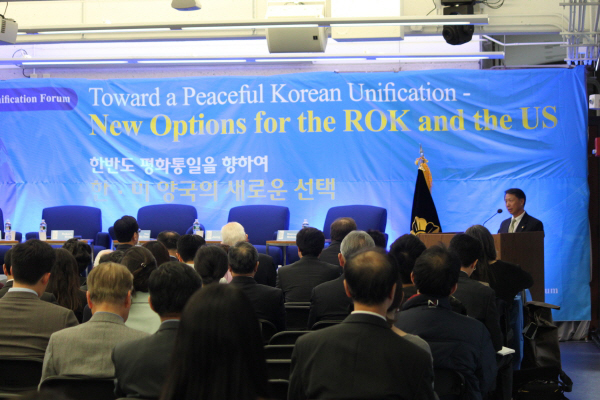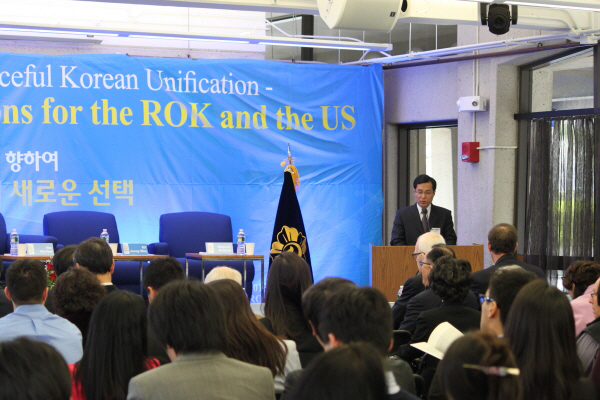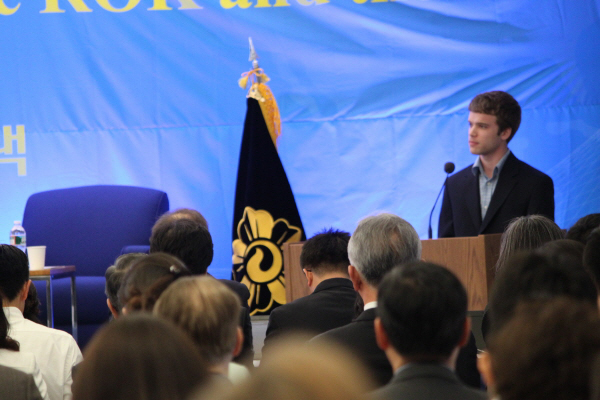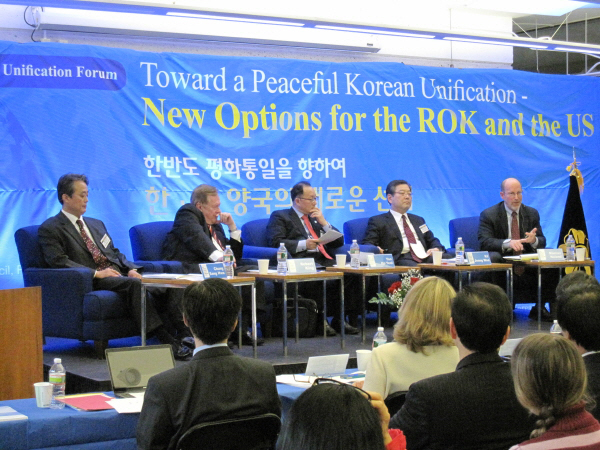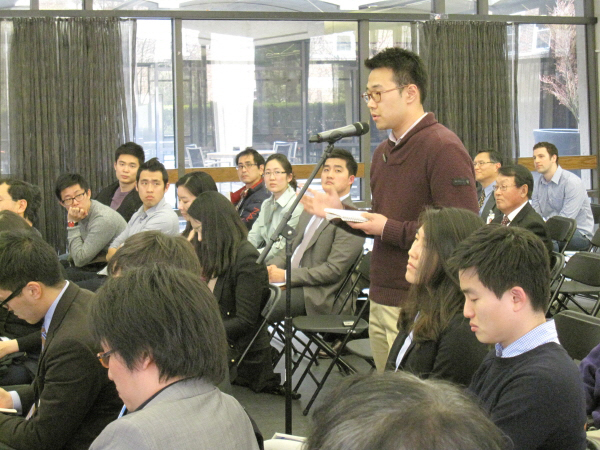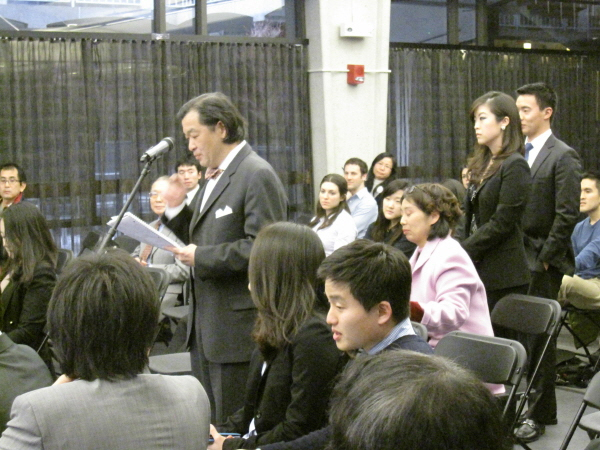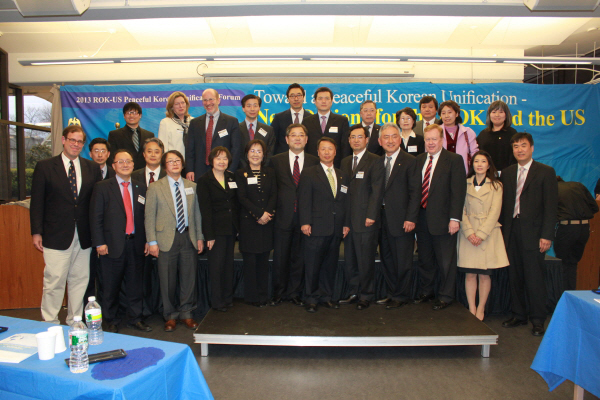| Форум «Мирное объединение. Отношение Кореи и США. 2013 год» |
|---|
| Отдел зарубежного региона, 2013-04-12 |
Korea-US Peaceful Unification Forum Held at Boston
Former and current officials and politicians influencing policymaking participate; open discussion held on the policy of the newly launched Korea and US governments toward North Korea
The 2013 Korea-US Peaceful Unification Forum was held on April 11 at the Event Hall of Hilles Library of Harvard Univ. in Boston by inviting experts from the two sides.
The Forum was arranged to diagnose and forecast the policy of the two newly launched governments toward North Korea under the changed political environments, with the Park Geun-hye Administration in Korea and the second presidential term of Obama.
The Forum was arranged to diagnose and forecast the policy of the two newly launched governments toward North Korea under the changed political environments, with the Park Geun-hye Administration in Korea and the second presidential term of Obama.
1. Opening Ceremony
Hong Jin-seob, Head of the Boston Municipal Chapter, and Consul General Park Gang-ho to Boston opened the Forum. A student representative of a college club called "Human Rights in North Korea," which supported the forum, gave a welcoming speech.
2. Keynote Speech
The keynote speech was given by Mr. Stephen Bosworth, former US Ambassador to Korea. "North Korea seems to be not too keen on abandoning its nuclear weapons right away, but the situation can be improved through continuous negotiations with surrounding countries. There is a limit to Washington and Beijing solving the North Korean issues. The policy of Seoul toward Pyeongyang and the public opinion of the South will play an important role in solving the problem," he said.
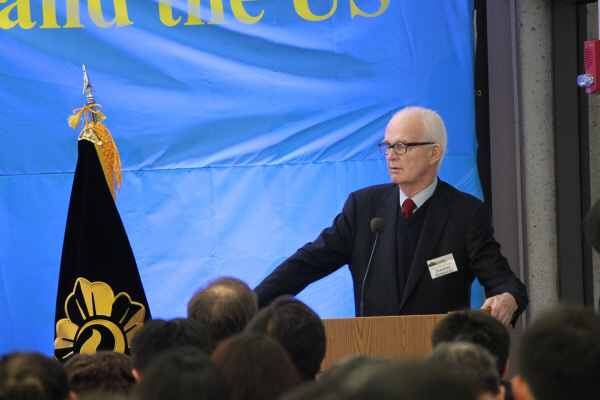
3. Panel 1: A New North Korea Policy of ROK and United States
The first session of the forum discussed the policy of South Korea and US toward North Korea. Rep. Gil Jeong-woo(Saenuri Party), Prof. Yoo Ho-yeol of Korea Univ., Jeong Sang-hwa, researcher of Sejong Institute, Robert King, Envoy for Human Rights in North Korea of the US Dept. of State, and Marcus Noland, director of the US’s Peterson International Economy Institute, attended the forum.
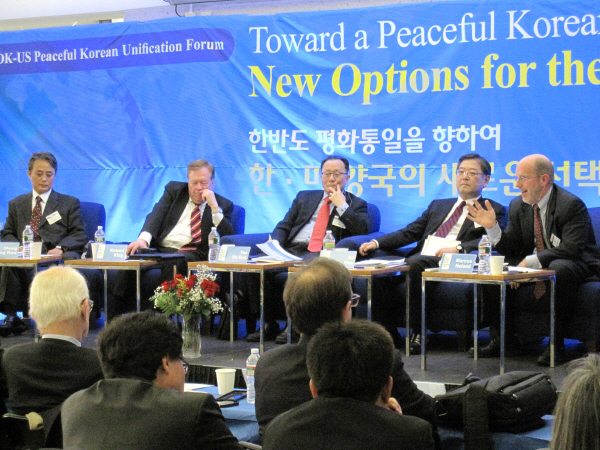
Mentioning Trustpolitik, Rep. Gil Jeong-woo noted how the provocation of North Korea and international sanction against it are merely being repeated. “The solution to stop such vicious cycle is to build trust in the Korean Peninsula -- in other words, operate the Korean Peninsula Trust-Building Process. It means its ultimate goal is to build a peaceful Korean Peninsula but proceed with the current situation through dialogue while maintaining the principles," he stressed.
According to Ambassador Robert King, the key of the policy toward North Korea is close cooperation between South Korea and US. A sustainable solution cannot be drawn unless South Korea and US follow the same strategy toward North Korea. The most important part of the US policy for North Korea is the human rights in North Korea. A humanitarian approach like Eugene Bell Foundation is required, he adds.
"According to public opinion polls conducted in Korea 20 years ago on ‘When do you think national unification can be achieved?’ most of the respondents said, ‘20 years later.’ Now, the recent poll got the same answer: ‘20 years later.’ The new administration of Korea should have such answer changed to ‘15 years later’ before it finishes its term," Prof. Yoo Ho-yeol said.
According to Ambassador Robert King, the key of the policy toward North Korea is close cooperation between South Korea and US. A sustainable solution cannot be drawn unless South Korea and US follow the same strategy toward North Korea. The most important part of the US policy for North Korea is the human rights in North Korea. A humanitarian approach like Eugene Bell Foundation is required, he adds.
"According to public opinion polls conducted in Korea 20 years ago on ‘When do you think national unification can be achieved?’ most of the respondents said, ‘20 years later.’ Now, the recent poll got the same answer: ‘20 years later.’ The new administration of Korea should have such answer changed to ‘15 years later’ before it finishes its term," Prof. Yoo Ho-yeol said.
Jeong Sang-hwa, researcher of Sejong Institute, believes that the North Korean regime may not last long because the current economic model of Pyeongyang is not sustainable, and that eventually North Korea will enter the market economy. Furthermore, the Kim Jeong-eun system may be weakened due to its political illegitimacy, he says.
"North Korea stands in the middle of the issue of the Korean Peninsula. We should find a way to solve it while accepting North Korea as it is. It is important for North Korea to be reformed, and we should find the system for inducing North Korea to change," Dr. Marcus Noland explained.
After the session, the audience asked questions about the problem of North Korean defectors in South Korea, their human rights, and the possibility of investing in North Korea.
"North Korea stands in the middle of the issue of the Korean Peninsula. We should find a way to solve it while accepting North Korea as it is. It is important for North Korea to be reformed, and we should find the system for inducing North Korea to change," Dr. Marcus Noland explained.
After the session, the audience asked questions about the problem of North Korean defectors in South Korea, their human rights, and the possibility of investing in North Korea.
4. Coffee Break
Before the second session, Human Rights in North Korea, a Harvard University students' club, presented a film made by the Eugene Bell Foundation titled "Fight against Tuberculosis in North Korea.” Attendants saw the real situation of North Korea through the film.
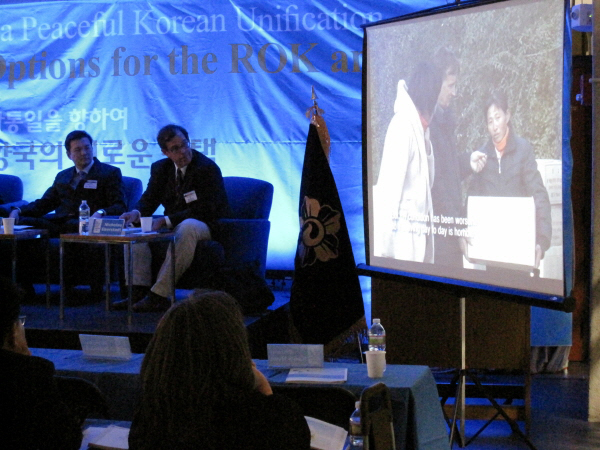
5. Panel 2: Reinforcing the ROK-US Alliance -- Continuity and Change
The second session proceeded with the theme of ROK-US alliance. Ms. Kathleen Stephens, former US Ambassador to Korea, presented her opinion, followed by Prof. Lee Jeong-hoon of Yonsei Univ., Prof. Lee Seong-yoon of Tufts Univ., Nicholas Eberstadt, researcher of the US’s Enterprise Institute, and Prof. Wu Hyun Suk of Kyunghee Univ.
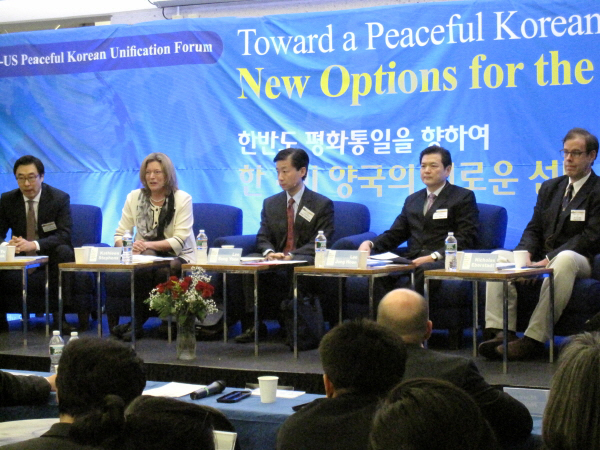
Ms. Kathleen Stephens, former US Ambassador to Korea, quoted the old saying "An ounce of prevention is worth a pound of cure." According to her, we need to pursue not only military cooperation but also the sharing of future values between the US and Korea, firmly believing that, if we prepare ourselves in advance, we can cope with any change.
"The future of Korea-US cooperation depends on the expansion of partnership beyond the Korean Peninsula and building of various cooperation channels between the private and public sectors of the two countries," said Prof. Lee of Yonsei Univ.
Prof. Lee Seong-yoon of Tufts Univ. stressed that peace in real terms can be achieved by more restrictions and sanctions against the Kim Jeong-eun regime through close cooperation between South Korea and US.
"The future of Korea-US cooperation depends on the expansion of partnership beyond the Korean Peninsula and building of various cooperation channels between the private and public sectors of the two countries," said Prof. Lee of Yonsei Univ.
Prof. Lee Seong-yoon of Tufts Univ. stressed that peace in real terms can be achieved by more restrictions and sanctions against the Kim Jeong-eun regime through close cooperation between South Korea and US.
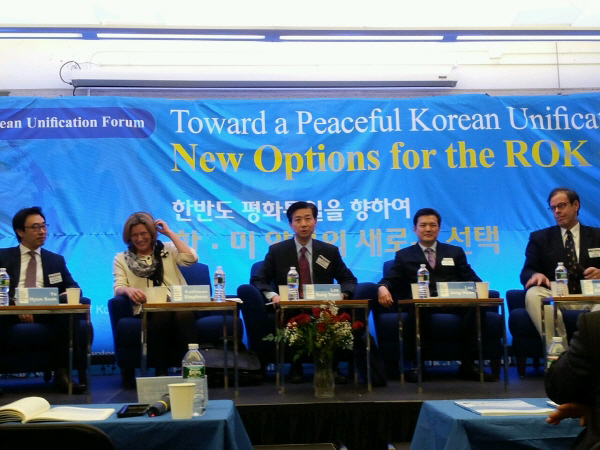
"The US-Korea alliance should now advance into the stage of considering the future. This means that we should review the North Korean system after unification, change of the US-Korea alliance after unification, efforts for Korea and Japan to strengthen their cooperation, and dialogue with China to get its support for the unification of the Korean Peninsula," Dr. Nicholas Eberstadt said.
Meanwhile, Prof. Yoo Hyun-seok of Kyunghee Univ. emphasized the importance of proper distribution of Korean diplomatic ability to Korea-China and Korea-US. South Korea should secure US support for the current keynote of the Korean government. President Park's visit to the US helps strengthen the alliance between the two old friends, he says.
Meanwhile, Prof. Yoo Hyun-seok of Kyunghee Univ. emphasized the importance of proper distribution of Korean diplomatic ability to Korea-China and Korea-US. South Korea should secure US support for the current keynote of the Korean government. President Park's visit to the US helps strengthen the alliance between the two old friends, he says.
Many overseas Koreans in Boston including Korean students participated in the forum in addition to the Boston Municipal Chapter members. Students of the Harvard club called "Human Rights in North Korea," Kennedy School, Brown University, and Tufts University also attended the forum.
▷The following day of the forum
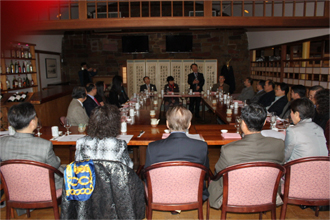 Leaders of religious groups in Boston and Korean communities in the city were invited to a meeting. They included Jang Soo-in, Vice-chairperson of the Korean Association, representatives of civic groups, Christian church association, Korea-US Arts Association, Harvard Korean Christian Missionary, and Korean War veterans. Prof. Yoo Ho-yeol of Korea Univ. gave a lecture on the new government's policy for North Korea and the path that the Korea-US alliance should follow.
Leaders of religious groups in Boston and Korean communities in the city were invited to a meeting. They included Jang Soo-in, Vice-chairperson of the Korean Association, representatives of civic groups, Christian church association, Korea-US Arts Association, Harvard Korean Christian Missionary, and Korean War veterans. Prof. Yoo Ho-yeol of Korea Univ. gave a lecture on the new government's policy for North Korea and the path that the Korea-US alliance should follow.
